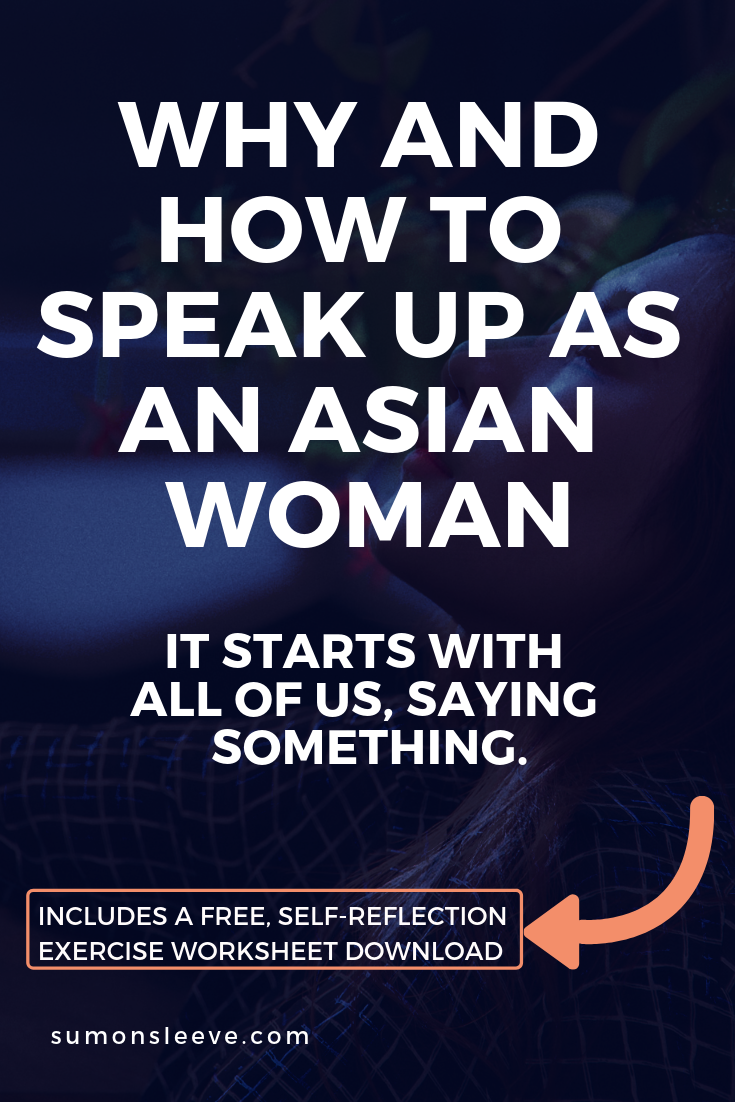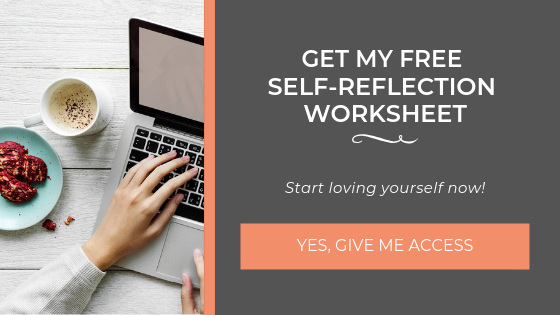
The quiet, submissive Japanese businesswoman; the self-sacrificing, man-pleasing Chinese wife; the docile, needy Korean female international student.

Whenever I hear these stereotypes, I first cringe in disgust knowing that these are some people’s fantasies; then, a wave of anger hits me like a ton of bricks, mad about the misperception media has played in creating them.
I am an Asian woman.
But I am not those Asian women.
I am a feminist who voices her opinions.
I am a strong and independent Asian woman.
I am a thought leader.
I am educated.
I am empowered.
I am a mother who fights for her rights.
I believe all women would have the same reaction to these stereotypes.
I live and work in an environment where sexist remarks are taken seriously and consequences are put to action.
I grew up after we had burnt the bras, during a time where women will link arms whenever we are discriminated. In healthcare, the industry I’ve worked in for over a decade, female executives are a dime a dozen.
See related: Breaking The Asian Female Stereotype: Muscles, Power, and Passion, 1 Simple Thing You Can Do Right Now To Be Happier, Having Coffee with Honourable Mary Ng, The First Chinese Canadian Cabinet Minister
Learning To Speak Up In My Professional Life
Over 6 years ago, I started working at my current job and I was responsible for promoting a culture of patient safety, specifically encouraging front-line paramedics to report near misses and safety incidents.
For those not in healthcare, a culture of patient safety refers to “an integrated pattern of individual and organizational behaviour, based upon shared beliefs and values, that continuously seeks to minimize patient harm that may result from the processes of care delivery.” (Kizer, 1999)
In my first month, I went on my first solo business trip out to rural Northern British Columbia to visits multiple ambulance stations.
Imagine me, a short and petite, Asian young woman, in her mid-20’s walking into an ambulance station with her pink and black snow boots, presenting to 15 Caucasian, middle-aged male seasoned paramedics, salty AF, preaching about why they should report their errors.
They questioned who I was, my role, my credentials, my authority. They scoffed at my words. They were skeptical, condescending. They didn’t take me seriously. They were disengaged and wanted me out of there. I didn’t make a dent.
After an hour, I went back to my rental car, licked my wounds and drove to the next station.
Over the course of the next year, every time I faced resistance, I learned to speak up for myself. I had a job to do and I wanted to do it well. I rehearsed a story of why they needed to listen to me, demonstrated my grit, anticipated their dismissive attitude and navigated their skepticism with ease. With each trip I took, my skin got thicker and my confidence grew.
With many years under my belt, it’s not a struggle to speak up at work because I’m used to it. My employer expects me to
In addition, there are policies, protocols and resources dedicated to ensuring a healthy workplace culture. If I am being discriminated against, there are channels for me to direct my concerns and I feel safe speaking my mind.

Learning To Speak Up In Public
So professionally, the infrastructure exists to support speaking up and I had many opportunities to practice.
However, in the public,
Imagine this scenario:
X can be anything from divorce to money problems to a cancer diagnosis.
An Asian mom and her daughter driving to a family dinner
Asian Mom: “Don’t talk about X when Auntie Y is around.”
Asian Daughter: “Why?”
Asian Mom: “Because it’ll offend her.”
Asian Daughter: “Why?”
Asian Mom: “Because then you’ll make me look bad.”
Asian Daughter: “Why?”
Asian Mom: “Because I said so.”
At the family dinner
Asian Daughter: “X”
Auntie Y: *Silence*…*Stands Up*…*Excuses herself*
Asian Mom: *frowns at daughter*…*pretends not to hear*… proceeds to change the topic.
After the family dinner, on the drive back home
Asian Mom: “I told you not to mention X. Now I have to call your Auntie Y to explain and apologize.”
Asian Daughter: *confused*
I’ve seen this and I’ve experienced this.
From the perspective of the daughter, I grew up without understanding why a certain topic may be offensive to others, without the skills to properly bring it up, believing that the best practice is to avoid talking about it.
From observing the reactions of women like Auntie Y, I learned that the only way to react when someone says something that offends me is to not speak at all, avoiding confrontation.
From witnessing women like the Asian mom in this scenario, I was taught to warn others about ‘sensitive’ topics as to prevent conflict, protecting the peace and saving face at all costs.
These moments shaped me very subtly, like a frog that slowly gets boiled alive. Except as the frog, I became aware of the heat when I started transferring my professional experiences into situations outside of work.
How did that journey begin?
I break it down into 3 stages:
1. Replace Silence With Anything
2. Ask Questions
3. Have A Respectful Conversation
Replace Silence With Anything
‘Twas a dark and stormy night. My male friend is driving us to KFC. We turn left at the light, about to drive into the parkade when we get rear-ended by a truck (I guess someone had a really bad fried chicken fix).
My friend pulls over and we come out. The other driver was this massive, Caucasian man with a beard and belly wearing a baseball cap. His wife stays in the truck as he climbs out.
At that moment, I go back to the car to get a flashlight. I come back, turn the flashlight on, shining it on the bumper.
The man glares at me, “Lady, what do you think you’re doing? I barely touched his car. You people just wanna make a quick buck or something.”
Then he looks at my friend, “You tell your girlfriend here she doesn’t need a flashlight since there’s no damage.”
I’m flabbergasted but I didn’t want to stay silent. I’m not someone he can step on. I’ve dealt with this before. His insinuating racist and sexist comments were making my blood boil.
So I take a deep breath and I look sternly in his eyes, stating with as much authority I could muster at the moment, “It’s dark and it’s raining. All of us need to see if there is damage.”
He curls his lip, rolls his eyes and goes back to his truck to get his insurance papers.
Saying something is better than nothing, even if it’s something simple like stating the facts. I won’t change that man’s beliefs about Asian women but at least he heard my voice.
Because once we have a voice, then we can start changing the dialogue, setting an example for the future generation of Asian women.

Ask Questions
When I was 6 months pregnant, I attended a work conference. It was lunch time and there were cookies for dessert.
I go grab one when an Asian woman (around my age) beside me touches my hand.
I look at her and she states in a condescending manner, “Are you sure you want a cookie? You might get gestational diabetes.”
I was like, “WTF?” This woman has absolutely no idea what my health status was nor did she know my history of disordered eating. If she had any actual knowledge about gestational diabetes, she’d know that eating a single cookie won’t raise your risk of developing it. Plus, you just don’t say shit like that to a pregnant woman!
I was clearly offended. I wanted to tell her to “fuck off” or ignore her by walking away.
Instead, I asked, “Excuse me? What do you mean?”
She elaborates, “When my sister was pregnant, she ate a lot of sweets and got gestational diabetes.”
I ask, “How’s your sister now?”
She responds, “Oh she and my niece are fine.”I ask, “Do you have kids?
She answers, “No.”I ask, “So you don’t know how it’s like being pregnant?”
She gives me a weird look, “No.”I state, “OK then.”
I grab my cookie, look her in the eye, take a big bite and leave.
When we ask questions, it forces the other person to share more about whatever you’re offended by. It can explain a lot about the person and why they would say such a thing. And having an understanding of where they came from can help diffuse our own heated emotions.
I didn’t correct her knowledge about gestational diabetes; however, I’d like to think that I set an example as a fellow Asian woman, giving her a moment of self-reflection and possibly inspiring her to also ask questions the next time she gets offended.
Have A Respectful Conversation

The third stage involves expressing your opinion on the matter and why you feel strongly about it with the possibility of changing their mind.
When we hear peoples’ stories and how they’ve dealt with offensive comments, we’ll say things like, “You should have said this” or “I would have done that.” But we really don’t know how the conversation actually went and the emotions that each party felt.
Therefore, this last stage is a decision point that depends on the situation. I don’t think it’s realistic to have a thorough conversation with everyone who has offended you.
I mean, just the other day, someone wrote I was “gaslighting and racist” on my blog post about Asians and Materialism. I decided not to engage because there was no merit in responding. However, someone like a parent making a negative comment about my daughter, I’m going to want a respectful conversation with them.
It comes down to the following:
How much does this person matter to you?
What’s your relationship with them?
Does that offensive comment now make you uncomfortable being around them?
Are they saying something about someone vulnerable who you want to protect?
What are you trying to get out of the conversation? Change their mind? Inform them?
For most of my life, I believed if I expressed myself authentically, making decisions that aligned with my values, having faith in society to shun discrimination, then no one would dare put me in a box.
However, when I had my daughter, it made me think critically about why Asian female stereotypes are formed, how they’ve affected me and why I need to be more active in dispelling them.
Because at the end of the day, I feel hopeful there is a future for my daughter where no preconceived assumptions are made about who she is based on her gender and/or race. And it starts with all of us, saying something.
See related: Breaking The Asian Female Stereotype: Muscles, Power, and Passion, How I’m Changing Asian Stereotype Parent Career Expectations, How I Preserve My Culture As An Asian Canadian Mom, Having Coffee with Honourable Mary Ng, The First Chinese Canadian Cabinet Minister





